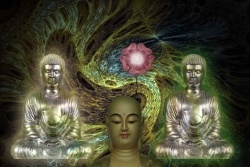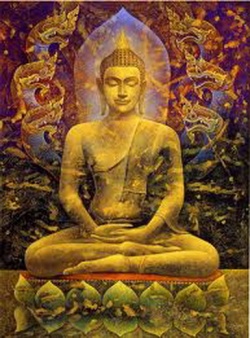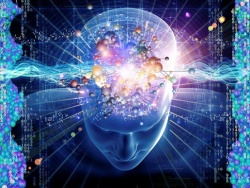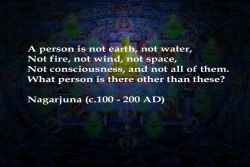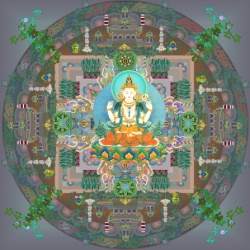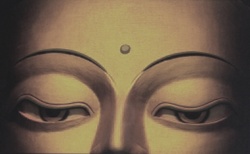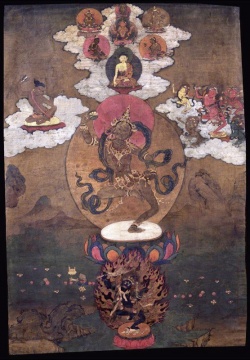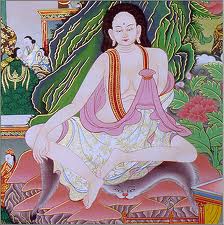The Subject-Object Illusion
<poem>
The whole problem is that we think of ourselves as ourselves. That is, as objects – bestowed with sentience, perceivers of the world, stumbling our way through life burdened by circumstances over which we have no control, all the while pretending that we do. And always lurking in the back of our mind is the knowing that ultimately we are going to die.
Seeing ourselves as objects is of course inevitable, given how we regard time and space as separate from us. I mean, if you think that objects exist in space out there, how would you ever see yourself as anything other than a perceiver of them? If we believe that objects are real, we must necessarily also believe that whatever perceives them is itself an object. Be it a brain, a soul, or a person, it must be some spatially distinct entity – and such an object, we refer to as a subject.
Let me be clear. Objects do not actually exist. Time and space are not objectively real. I just want to point out that if anyone believes that time and space is out there, they must admit that, logically, objects must be perceived by other objects (which we call subjects) – for as long as objects are regarded as things-in-themselves, the notion of an object necessarily involves the notion of a subject, since to be a thing-in-itself specifically means to exist independently of a perceiving subject. In other words, according to our misconstrued conceptual schema of reality, objects must – simply by how we define them and think about them – be perceived by a subject.
And since most of us do believe that subjects and objects are real, whenever we encounter an object we inevitably see ourselves as its subject.
This is the mistaken identity from which we seek to free ourselves.
And so, if we are to awake, we must rid ourselves of this notion of objects existing in their own right. It’s not the objects as such that are the problem, but their subject, and by abolishing the notion of an object as a thing-in-itself we thereby abolish the notion of its subject also – and that is why I stress the importance of understanding that there is no external world.
However, simply understanding that objects and subjects don’t actually exist isn’t enough. Conditioning is too strong. Decades of objectivizing day in and day out have established a habit that cannot be overcome by intellectual understanding alone – and it’s objectivization that is the real obstacle to awakening.
Objectivization can be understood as the functional aspect whereby this-which-we-are perceives what it is as an object. It’s a way of cognizing by means of conceptualization. We fabricate objects in the mind by turning what is nothing but pure perceiving into objective concepts such as “a lamp”, “a coffee mug” and “the moon” – and since we regard them as independently existing entities, we imagine ourselves into existence as their subject, namely the very subject whose perceiving they are supposedly independent of.
So, all of this can be summarily understood as follows: this-which-we-are, or pure consciousness if you will, perceives itself as an object (such as “a lamp”) by means of an subject (such as “myself”) – neither having any existence whatsoever other than conceptual – and thereby manifests this entirely illusory objective world and self. And all of this takes stage where there is nothing but pure subjectivity, which is no thing whatsoever.
It’s a division through conceptualization. In conceptualizing, pure experiencing is divided into interdependent conceptual counterparts: “subject” and “object”, “self” and “world” or “in here” and “over there”. We then add layer upon layer of other ideas to this imagined entity in here, thereby creating an entire edifice of figments that come to constitute our ego – the self image.
But all of these ideas are built upon the idea of a subject – and when conceptualizing ceases, the very linchpin of our identity is removed, because the subject is no longer fabricated in the mind. In this absence, looking stops and seeing begins – and no longer bound by objectivization, we find ourselves simply, awake.
Note: Anyone who claims that objects are objectively real and at the same time say that consciousness is “prior to” or “beyond” time and space are talking out of their hats. If time and space are objectively real, there can be no “prior” to time or “beyond” space – for those are themselves temporal and spatial concepts with no application independently of time and space.
Artwork by ratpat13
Source
dharmaconnectiongroup.blogspot.com.au
Göran Backlund - Monday, August 4, 2014 at 6:13pm
http://www.uncoveringlife.com/the-subject-object-illusion/ Piotr Ludwiński - Monday, August 4, 2014 at 8:31pm pure perceiving into objective concepts such as “a lamp”, “a coffee mug” and “the moon” – and since we regard them as independently existing entities, we imagine ourselves into existence as their subject, namely the very subject whose perceiving they are supposedly independent of.
So, all of this can be summarily understood as follows: this-which-we-are, or pure consciousness if you will, perceives itself as an object (such as “a lamp”) by means of an subject (such as “myself”) – neither having any existence whatsoever other than conceptual – and thereby manifests this entirely illusory objective world and self. And all of this takes stage where there is nothing but pure subjectivity, which is no thing whatsoever."
From dharma POV understanding objectivization in this way does not and simply can't lead to awakening and removal of suffering. At least in way how profound prajnaparamita dharma defines awakening and removal of suffering.
As far as buddhahood is concerned such explanations and way of enquiry is poor and comes from mind ignorant of meaning of four noble truths. Conventionally not bearing any possibility for removal of emotional and cognitive afflictions this article is non-functional for dharmic practicioner.
Let no child in refuge of great mother prajnaparamita be fooled by teachings rich only for appearance.
The reason is that enquiry which takes pure experiencing as basis of ignorance and wisdom won't ever realize two truths correctly.
Pure experiencing that such enquiry reveals for mind as what remains after subject and objects (as they are defined by limitations of such enquiry) are refuted is grasped in way that prajnaparamita designates as grasping at inherent existence. Pure experiencing then appear as such (inherently existent).
In actuality pure experiencing like everything else is dependently originated; having only conventional existence and being imputed upon aggregation. Just like person on TV screen is not person but appears as such due to conditions, parts and functionality that being person bears; pure experiencing as non-dual samadhi appears to confused mind as such because it's imputed upon basis of conditions, parts and it's function.
Nowhere there is pure experiencing that exists independently of sheer force of imputation. Since dharma ultimately must purify mind altogether of any notion of any event as experience, wether as one or many, taking pure experiencing as basis upon which ignorance and wisdom relatively happens is unsuitable for fruition that holy life is supposed to lead to. Refuge in dharma is profound teaching according to which that which is dependetly arisen is non-arisen. Refuge is not pure experiencing since it's only relative (conventional) nature of mind. Refuge is it's and all other phenomena' non-arising, non-abiding and non-perishing.
May all be happy and prosperous Christine Walsh - Monday, August 4, 2014 at 10:23pm If it's non-arisen anyway, why doesn't it just stop already. It's mostly boring and painful and if there's no point, then why can't it just stop!? Stuffs RedTurtle - Monday, August 4, 2014 at 11:16pm I think you have to root out the cause of the five poisons and the eight worldly attachments... I don't think denying objective reality actually solves anything, it's just another view. For me this has been work. Maybe article is good help in intellectual understanding, but maybe that is it.
Or yeah, what Piotr said ;) Göran Backlund - Monday, August 4, 2014 at 11:19pm Food for thought: is denying the existence of square circles just another "view"? Is it a nihilistic extreme? Or is it seeing clearly that the idea of square circles is simply an fallacious idea? Stuffs RedTurtle - Monday, August 4, 2014 at 11:24pm Well, here's my problem. I can see that the chair is no more than shape and color In dreams things seem real and have solidity too, but in a dream I can fly and probably use telekenesis as soon as I have an inkling that I might be dreaming. In waking life, if I try to fly, I'm falling to my death. So until I can put my arm or foot through a solid wall, it's a view. Piotr Ludwiński - Monday, August 4, 2014 at 11:27pm Christine Walsh it does not work that way. We can't jump to "non arising anyway" without understanding what is exactly to be refuted. What is dependently arisen is without inherently existing arising, duration and cessation. If we skip first part of this statement and produce mistaken mental replica of what non-arising means we will always either refute too much or too little.
Not only ultimately there is nothing to be found that "pure experiencing" really is but likewise it is devoid of inherent characteristics; meaning pure experiencing is inherently not boring, painful and meaningless.
Experiencing can't stop (ultimately); it can stop conventionally as in nirodha samapatti, deep sleep etc.
But the point is that pure experiencing as defined by mode of enquiry of article pasted above is not unmistaken pure cognition of aryas on bhumis.
Unmistaken cognition denotes equipoise of aryas on bhumis in which they do not perceive inherently existing entities and non-entities. They realize non-conceptually that all selves, activities, processes, events, things and non-things (like space and time or formless absopritons) being dependent arisings are non-arising. Only aryas on bhumis directly discover purity of experiencing.
Ultimately purity of experiencing means that when looked for nothing that experiencing really is can be found. Likewise no way it really is (wether it's boring or joyous) can be found in ultimate analysis. There is no positive state to observe after undergoing ultimate analysis apart from conventional one. It's not the case that refuting this (for example subject and physical objects) as result that remains (pure experiencing). Stuffs RedTurtle - Monday, August 4, 2014 at 11:32pm Piotr I like your peter Gabrielle sledge hammer prof pic :) looks like it maybe you are too young to remember that music video though :) Piotr Ludwiński - Monday, August 4, 2014 at 11:35pm Hi Stuffs. In dharma chair is not reduced to shape and colour. Chair is observed to be dependent arising; meaning that it's existence is imputed upon something else (basis for imputation); like causes and conditions, parts, functionality and our various way of cognizing it. Shape and colour are empty in exact same way. Stuffs RedTurtle - Monday, August 4, 2014 at 11:44pm Oh okay thanks. Mixing Greg's book in there :) But in referring to what this article is talking about seems to be coming from that model, at least that is the impression I got from it Kyle Dixon - Tuesday, August 5, 2014 at 12:36am There is nondual advaita (subject and object are one or merged - such as only subjectivity etc.) and there is nondual advaya where the conditioned dharmin is nondual with its non-arising unconditioned dharmatā.
The buddhadharma accords with advaya, which means partitions are allowed for rather than subject and object being merged into a single capacity of whatever stripe, like pure experience or pure consciousness etc.
For example from Löpon Tenzin Namdak:
"If you think that (Nature) is one without individual partitions, that this 'one' pervades everything, then that is breaking your Dzogchen Damtsig and goes against the Dzogchen View."
It is a vital distinction which will make or break one's view entirely. David Vardy - Wednesday, August 6, 2014 at 1:44am The word 'thought' is a loaded word, humor aside. For one it simply means the garden variety of self talk, another the entire web, including assumptions of space and time required for duality to be conceived as what's real. Seeing through the 'subject/object' dilemma requires nothing less than the deconstruction of apparent and not so apparent constructs. I don't imagine that Goran has simply skipped beyond what in essence is our collective burden here. David Vardy - Wednesday, August 6, 2014 at 3:53am Comments from Soh at http://awakeningtoreality.blogspot.com/.../my-commentary...
"Non-duality is very simple and obvious and direct... and yet always missed! Due to a very fundamental flaw in our ordinary dualistic framework of things... and our deep rooted belief in duality."
"In the seen, there is just the seen! It is completely non-dual... there is no 'the seen + a perceiver here seeing the seen'.... The seen is precisely the seeing! There is not two or three things: seer, seeing, and the seen. That split is entirely conceptual (though taken to be reality)... it is a conclusion due to a referencing back of a direct experience (like a sight or a sound) to a centerpoint. This centerpoint could be a vague identification and contraction to one's mind and body (and this 'center of identification within the body' could be like two inches behind your eyes or on the lower body or elsewhere), or the centerpoint could be an identification with a previous nondual recognition or authentication like the I AM or Eternal Witness experience/realization. It could even be that one has gained sufficient stability to simply rest in the state of formless Beingness throughout all experiences, but if they cling to their formless samadhi or a 'purest state of Presence', they will miss the fact that they are not just the formless pure existence but that they are/existence is also all the stuff of the universe arising moment to moment... And when one identifies oneself as this entity that is behind and separated from the seen, this prevents the direct experience of what manifestation and no-self is." Stuffs RedTurtle - Wednesday, August 6, 2014 at 6:10am David, you are saying there is no seeing by the eyes? David Vardy - Wednesday, August 6, 2014 at 6:43am From first person, no, there isn't seeing by the eyes. Kyle Dixon - Wednesday, August 6, 2014 at 6:49am Ultimately the eyes and seeing are empty, so ultimately no there is no seeing.
"Thus, monks, the Tathāgata does not conceive an [[[object]]) seen when seeing what is to be seen. He does not conceive an unseen. He does not conceive a to-be-seen. He does not conceive a seer." -- AN 4.24 Kāḷakārāma Sutta
"'Seeing no thing is the supreme sight.'... We then see that there isn't even a hair-tip of something to see. It is as the Heart Sutra said: 'No form, no feeling, no perception, no formation, no consciousness, no eye, no ear, no nose, no tongue, no body, no mind' That absence of any concrete substance whatsoever is called dharmakāya." -- Tulku Urgyen Rinpoche David Vardy - Wednesday, August 6, 2014 at 6:29pm Yet by virtue of seeing it's seen there's no one to see and no thing to be seen. Geovani Geo - Thursday, August 7, 2014 at 8:34am By virtue of knowing it is known that there is no way to know. Soh Wei Yu - Thursday, August 7, 2014 at 12:21pm Christine Walsh wrote: "If it's non-arisen anyway, why doesn't it just stop already. It's mostly boring and painful and if there's no point, then why can't it just stop!?"
Check out http://www.thezensite.com/.../Nagar.../Dependent_Arising.htm by Jay Garfield:
The opponent is seeing actual existence as a discrete entity with an essence. It would follow that for the opponent, the reality of emptiness would entail that emptiness itself is an entity, and at that an inherently existing entity. To see emptiness in this way is to see it as radically different from conventional, phenomenal reality. It is to see the conventional as illusory and emptiness as the reality standing behind it. To adopt this view of emptiness is indeed to deny the reality of the entire phenomenal, conventional world. It is also to ascribe a special, nonconventional, nondependent hyperreality to emptiness itself. Ordinary things would be viewed as nonexistent, emptiness as substantially existent. (it is important and central to the Madhyamika dialectic to see that these go together--that nihilism about one kind of entity is typically paired with reification of another.) This view is not uncommon in Buddhist philosophy, and Nagarjuna is clearly aware that it might be suggested by his own position. So Nagarjuna's reply must begin by distancing himself from this reified view of emptiness itself and hence from the dualism it entails. Only then can he show that to reify emptiness in this way would indeed entail the difficulties his imaginary opponent adumbrates, difficulties not attaching to Nagarjuna's own view. This brings us to the central verses of this chapter (24:18 and 24: 19):
Whatever is dependently co-arisen That is explained to be emptiness. That, being a dependent designation Is itself the middle way. Something that is not dependently arisen, Such a thing does not exist. Therefore a non-empty thing Does not exist.
These verses demand careful scrutiny. In 24: 18, Nagarjuna establishes a critical three-way relation between emptiness, dependent origination, and verbal convention, and asserts that this relation itself is the Middle Way towards which his entire philosophical system is aimed. As we shall see, this is the basis for understanding the emptiness of emptiness itself. First, Nagarjuna asserts that the dependently arisen is emptiness. Emptiness and the phenomenal world are not two distinct things. They are rather two characterizations of the same thing. To say of something that it is dependently co-arisen is to say that it is empty. To say of something that it is empty is another way of saying that it arises dependently.
Moreover, whatever is dependently co-arisen is verbally established. That is, the identity of any dependently arisen thing depends upon verbal conventions. To say of a thing that it is dependently arisen is to say that its identity as a single entity is nothing more than its being the referent of a word. The thing itself, apart from conventions of individuation, is nothing but an arbitrary slice of an indefinite spatiotemporal and causal manifold. To say of a thing that its identity is a merely verbal fact about it is to say that it is empty. To view emptiness in this way is to see it neither as an entity nor as unreal--it is to see it as conventionally real. Moreover, "emptiness" itself is asserted to be a dependent designation (Skt prajnaptir-upadaya [brTen Nas gDags pal). Its referent, emptiness itself, is thereby asserted to be merely dependent and nominal--conventionally existent but ultimately empty. This is, hence, a middle path with regard to emptiness. To view the dependently originated world in this way is to see it neither as nonempty nor as completely nonexistent. It is, viewed in this way, conventionally existent, but empty. We thus have a middle path with regard to dependent origination. To view convention in this way is to view it neither as ontologically insignificant--it determines the character of the phenomenal world--nor as ontologically efficacious --it is empty. Thus we also have a middle way with regard to convention. And finally, given the nice ambiguity in the reference of "that," (De Ni), not only are "dependent arising" and "emptiness" asserted to be dependent designations, and hence merely nominal, but the very relation between them is asserted to be so dependent, and therefore to be empty.[8]
These morals are driven home in 24: 19, where Nagarjuna emphasizes that everything--and this must include emptiness--is dependently arisen. So everything--including emptiness--lacks inherent existence. So nothing lacks the three coextensive properties of emptiness, dependent-origination, and conventional identity.
With this in hand, Nagarjuna can reply to the critic. He first points out (24: 20-35) that in virtue of the identity of dependent origination and emptiness on the one hand and of ontological independence and intrinsic reality on the other, such phenomena as arising, ceasing, suffering, change, enlightenment, and so on--the very phenomena the opponent charges Nagarjuna with denying--are possible only if they are empty. The tables are thus turned: it appears that Nagarjuna, in virtue of arguing for the emptiness of these phenomena, was arguing that in reality they do not exist, precisely because, for the reifier of emptiness, existence and emptiness are opposites. But in fact, because of the identity of emptiness and conventional existence, it is the reifier who, in virtue of denying the emptiness of these phenomena, denies their existence. And it is hence the reifier of emptiness who is impaled on both horns of the dilemma s/he has presented to Nagarjuna: contradicting the ultimate truth, s/he denies that these phenomena are empty; contradicting the conventional, s/he is forced to deny that they even exist! And so Nagarjuna can conclude (24: 36):
If dependent arising is denied, Emptiness itself is rejected. This would contradict All of the worldly conventions.
To assert the nonemptiness of phenomena and of their interrelations, Nagarjuna suggests, when emptiness is properly understood, is not only philosophically deeply confused, it is contradictory to common sense. We can make sense of this argument in the following way: common sense neither posits nor requires intrinsic reality in phenomena or a real causal nexus; common sense holds the world to be a network of dependently arisen phenomena. So common sense holds the world to be empty. Again, the standpoint of emptiness is not at odds with the conventional standpoint, only with a particular philosophical understanding of it--that which takes the conventional to be more than merely conventional. What is curious--and, from the Buddhist standpoint, sad--about the human condition, on this view, is the naturalness and seductiveness of that philosophical perspective.[9] Soh Wei Yu - Thursday, August 7, 2014 at 12:22pm To summarize, as I wrote in my writing http://awakeningtoreality.blogspot.com.au/.../the-movie...
"Lastly it is not that things are mental projections but that they are dependent arising.. what dependently originates is empty and nonarising appearance... momentary suchness, but still as vivid." Stian Gudmundsen Høiland - Friday, August 8, 2014 at 2:37am Am I detecting a change in orientation towards emptiness, Soh? I like it, and I find Garfield not only aligns so well with my understanding, but he's also clearly articulate about it. Stian Gudmundsen Høiland - Friday, August 8, 2014 at 2:43am Jay Garfield writes:
> Moreover, whatever is dependently co-arisen is verbally established. That is, the identity of any dependently arisen thing depends upon verbal conventions. To say of a thing that it is dependently arisen is to say that its identity as a single entity is nothing more than its being the referent of a word. The thing itself, apart from conventions of individuation, is nothing but an arbitrary slice of an indefinite spatiotemporal and causal manifold. To say of a thing that its identity is a merely verbal fact about it is to say that it is empty. To view emptiness in this way is to see it neither as an entity nor as unreal--it is to see it as conventionally real.
I don't know how many times this point has been triumphantly shot down on this group by Kyle and others. Maybe they could comment on that in light of this commentary by Garfield? Stian Gudmundsen Høiland - Friday, August 8, 2014 at 2:50am Soh, I read your "summary" again (the comment following Garfield's commentary), and it seems to me that maybe, after all, you missed the whole point? Unless you mean something very specific by "mental projections" that is very different from what I understand that to mean.
> Nagarjuna establishes a critical three-way relation between emptiness, dependent origination, and verbal convention, and asserts that this relation itself is the Middle Way towards which his entire philosophical system is aimed.
> To say of a thing that it is dependently arisen is to say that its identity as a single entity is nothing more than its being the referent of a word.
So, keeping in mind these quotes and the quote in my previous comment, how is it that emptiness does not denote mental projection? Stian Gudmundsen Høiland - Friday, August 8, 2014 at 2:59am I think this part bears repeating yet again:
> The thing itself, apart from conventions of individuation, is nothing but an arbitrary slice of an indefinite spatiotemporal and causal manifold.
This represents an actual, mega-realization for me personally. Kyle Dixon - Friday, August 8, 2014 at 3:04am Stian, There's a difference between a conventional designation being merely inferential and the "things are only concepts" idea which does not address the same insight that dependent origination does. Kyle Dixon - Friday, August 8, 2014 at 3:08am One can tout that the identity of a given thing is merely verbal or conceptual in nature and still have a total lack in understanding regarding dependent origination and cause/condition. Kyle Dixon - Friday, August 8, 2014 at 3:10am One can see neo-nondual reasoning all over Facebook groups which proclaims that things are merely concepts, yet there is still a complete poverty in true understanding in those individuals.
Due to the fact that cause and condition are not understood. David Vardy - Friday, August 8, 2014 at 3:11am Not a lack of understanding of dependent origination. A lack of understanding of the depths of language and its relation to dependent origination. Dependent origination is a 'thing' outside of language? Kyle Dixon - Friday, August 8, 2014 at 3:14am And the depths of tendency and habit predicated upon misconception. Kyle Dixon - Friday, August 8, 2014 at 3:18am Don't get me wrong, imputation plays a big role in reification etc., however it isn't the sole fulcrum that the entire afflictive balancing act rests upon... that is my only point. David Vardy - Friday, August 8, 2014 at 3:18am What's the root of misconception if not based in language? Piotr Ludwiński - Friday, August 8, 2014 at 3:18am "What's the root of misconception if not based in language?" as it has been already said teachings in question (buddhadharma) speak about innate sense of inherent existence of self and phenomena that is shared by all sentient beings wether they have and use language or not... David Vardy - Friday, August 8, 2014 at 3:22am Describe that. Soh Wei Yu - Friday, August 8, 2014 at 3:23am Advaita says names and forms are superimpositions/mental projections upon what is essentially the substratum of pure consciousness which is You, like superimposing snake on rope. The superimposition/mental projection of an objective universe is unreal, what is real is the pure subjectivity of Brahman, and Brahman is the universe.
Dependent origination and emptiness as understood in Buddhism is not the same. In emptiness, we do not say that everything is mental projection or superimposition upon an undifferentiated X (Subjectivity, Brahman, Pure Consciousness, etc). When we examine self/constructs/phenomena, be it conceptual or non-conceptual phenomena, we do not find them to be merely mental projections superimposed upon an undifferentiated and inherently existing substratum -- instead, what we see are total exertion of endless dependencies - seamless and intricate, yet no underlying irreducible and inherently existing substance/core/ground can be found. You can say the dependencies are manifold, you can even say they function seamlessly, some people even use terms like 'one body' but it's essentially a single flow/seamless dependency rather than the sort of one substance.
Yes, the conventional label is a conceptual imputation, however the insight of emptiness and D.O. is not about everything being merely concepts. It is through insight into D.O., emptiness, that the convention is realized to be conventional. Otherwise we do not see self as conventional designation, parts (five aggregates), function and dependencies/causes and conditions. We will see conventions as referential rather than inferential. We will see self as referring to an inherently existing self, agent, or even an ultimate self such as brahman, etc. We do not see water as a convention designated on parts (h2o), function, dependencies, we do not see car as a... well you get the idea.
Kyle wrote before: "The point of the buddhadharma is that there is no inherent 'it' which is inexpressible or inexhaustible etc. for if there was that would just be one more thing to be empty.
So there is only the conventions. There is no referent that the conventions attempt to portray or express. The point of emptiness is realizing that all conventions are inferential, and that realization liberates you from the cage of conditioning which sees 'its' and 'thats' and 'things' and so on." David Vardy - Friday, August 8, 2014 at 3:23am This might sound simplistic but has anyone ever had an insight that wasn't followed by "WTF was i thinking?" Piotr Ludwiński - Friday, August 8, 2014 at 3:26am That means that in afflicted perceptions of all sentient beings of all realms entities and non-entities appear as if they are established from their own side and they spontanoeusly grasp at their own existence without formulating speculative complicated theories that would account for it by attributing intellectual constructs with characteristic of being referential. Piotr Ludwiński - Friday, August 8, 2014 at 3:26am Many masters adress this issue in detail. Like His Holiness Dalai Lama in his books about emptiness etc. Lack of clarity about this issue is what Kyle meansby lacking clarity about cause and conditions. David Vardy - Friday, August 8, 2014 at 3:30am We just disagree on 'language'. In my book, it's the heavy lifter. It runs so deep it doesn't even require a word to operate. It's coded. Stian Gudmundsen Høiland - Friday, August 8, 2014 at 3:31am I read your replies here, but I don't think I will engage in the discussion any further than that. I have already done so many times in the past, and I don't think I can make the point any clearer than Garfield did in that commentary above. Kyle Dixon - Friday, August 8, 2014 at 3:32am Even a system like Dzogchen says that imputation is the most coarse form of ignorance, called kun brtags ma rig pa. Also also translated as both the ignorance of labeling and as the Ignorance of false imagination.
More subtle than that is lhan cig skyes pa'i ma rig pa, translated as innate ignorance, which is an underlying condition of ignorance which abides whether imputation is present or not. David Vardy - Friday, August 8, 2014 at 3:35am That's what I'm referring to when I say it's 'coded'. But it's still language based. Duality doesn't operate without a code, and all codes are language based. Kyle Dixon - Friday, August 8, 2014 at 3:36am As I wrote to another individual (who has various facebook groups and doesn't understand emptiness despite his misguided confidence that he does):
"In Prasanga Madhyamaka ALL phenomena are empty and non-arisen, but we cannot say there are solely conceptual designations due to the fact that there is ignorance which conditions one's perception regarding said (alleged) phenomena.
Also the fact that Prasangika proper states that imputation is only one way that phenomena are dependent. Either way though, if phenomena were solely conceptual designations, then when concepts were absent, the contention that phenomena exist would also be absent and all sentient beings would dwell in the knowledge of the ultimate (only becoming afflicted when a concept appeared). That of course is not the case, and phenomena appear to abide in time as existents even when concepts are absent. So there is more to the story, which is where ignorance and conditioning come into the picture." Kyle Dixon - Friday, August 8, 2014 at 3:38am Non-recognition isn't necessarily language based... seeing a rope lying in a dark room and mistaking it to be a snake isn't exactly language based, because that non-recognition can occur in the absence of conceptual elaboration. David Vardy - Friday, August 8, 2014 at 3:54am Kyle, you speak as if you're always aware of when language is operating. Perhaps you should look a bit deeper. David Vardy - Friday, August 8, 2014 at 3:56am Thinking its a snake while seeing a rope, isn't language based? Kyle Dixon - Friday, August 8, 2014 at 3:57am You mean the residual effects of conceptualization? Or language itself? David Vardy - Friday, August 8, 2014 at 3:57am Language doesn't require conceptual elaboration to operate. Kyle Dixon - Friday, August 8, 2014 at 3:59am So are we talking about language in the sense of the direct appearance of verbal dialogue or internal monologue? Or are we talking about the secondary effects of language in the form of conditioning? Soh Wei Yu - Friday, August 8, 2014 at 4:05am To add on to my previous post... if we mistake emptiness as referring to everything as mental projections/concepts, then we are missing the point about it -- it is rather an insight into dependent origination and the non-arising of dependent origination, lack of inherent existence, etc. It is a specific misconception that should be refuted and penetrated by prajna. Otherwise our path of practice is about trying to go beyond concepts/conventions to what is prior to concepts. This practice is good for de-conditioning the coarse form of ignorance, but does not penetrate the subtler delusions.
This also relates to what Thusness wrote:
John Tan “that analogy makes intellectual understanding seem not only useless but an unnecessary encumberance”
Hi Priscilla, I do not see intellectual understanding as necessarily an encumbrance. Given the following scenarios:
A) Non-conceptual experience of orange.
B) Conceptualization/intellectualization of orange
C) Non-conceptual experience of orange post conceptualization.
Many of Awareness teachings see liberation as eliminating B and returning to A.
But
Dharma (imo) is realizing that scenario C will never be the same as scenario A. C cannot be said to be A nor other than A and eliminating B is not necessary. The teaching of dharma is to liberate C at spot (as it is) by realizing the dependent origination of C and have experiential insight that whatever dependently originates is empty and non-arising. July 18 at 6:25pm · Unlike · 11 Soh Wei Yu - Friday, August 8, 2014 at 4:05am Ah wait.. pasted the wrong one
...updated. David Vardy - Friday, August 8, 2014 at 4:20am I'm suggesting that the 'apparent linking' phenomena is language based. It runs deep to the core of the experiencing structure, but in essence lacks essence. It's flimsy at best; its strength, the ability to operate 'seemingly' non-stop. The moment of insight reveals the tail you've been featured chasing, also revealing the sheer speed of the activity as the tail disappears into silence. Language is revealed to operate at speeds that are indiscernible compared to the talk we're featured engaged in right now or even in 'thought based monologue'. But it's also imbedded in the hard-ware so to speak, which might explain how the unraveling of language affects experience so thoroughly. Ej Alex - Friday, August 8, 2014 at 4:40am Are then animals also coded by a kind of primitive language? Kyle Dixon - Friday, August 8, 2014 at 4:42am What about toddlers or animals who clearly have "linking" processes yet are uninfluenced by language? (Ej Alex beat me to the punch as I was typing this out).
Again I'm not saying that language is unimportant, it certainly plays a vital role in much of this. However the proclivity to grasp at phenomena is somewhat more subtle than language itself... and initially language is predicated upon those subtle tendencies to grasp. Eventually language and those tendencies have a symbiotic nature of sorts, both fortifying one another.
Overall though I just don't see how the entire weight can be placed upon language. Kyle Dixon - Friday, August 8, 2014 at 4:49am Even yogins who initially see through conceptual constructs and recognize their nature still have to exhaust their latent karmic propensities. David Vardy - Friday, August 8, 2014 at 5:09am A primitive form of language is encoded in toddlers and animals. Of course. Lol. Anyone who has spent significant time with either will attest to that. David Vardy - Friday, August 8, 2014 at 5:14am Don't think we have to go into the Skinner Chompsky debate however. Kyle Dixon - Friday, August 8, 2014 at 5:23am Even in the context of these teachings, when notions such as "exhausting concepts", or "pacification of concepts" are evoked, 'concepts' does not mean simply 'conceptual thought'; but rather includes all abstractive fabrications that the deluded mind serves to manifest such as ideas, emotions, the five poisons, acceptance, rejection etc.
Imputation plays a large and vital role, but if the crux of the issue rested solely upon imputation then in the absence of imputation there would be no delusion.
It is important to uproot 'concepts' in their entirety and beware of the error of objectifying thought as a solitary culprit which can be pacified by rejecting thought (not saying you or anyone here is advocating for that, just using that as an example), because many make that error. David Vardy - Friday, August 8, 2014 at 5:28am Yes. And I'm just suggesting that language is even operating in the absence of what is normally called 'thinking', whether it be self talk or the kind of talk we're engaged in now. Kyle Dixon - Friday, August 8, 2014 at 5:33am It is more habitual tendency though in my opinion. Language is language, verbal expression, written communication, concepts etc. however there is also non-conceptual direct experience, unmediated by thought or verbal commentary. The underlying propensities which sustain delusion in those periods of nonconceptual experience are habitual.
Like a soldier at war who comes home and then has PTSD; the anxiety or fear, or other expressions of behavior and conduct are not so much 'language based' as they are the result of prolonged subjection to a certain environment (and the varying modes of behavior and conduct which are associated with that environment). Ej Alex - Friday, August 8, 2014 at 5:33am "We meditate on progressively subtler levels. These include focus on the simultaneous arising, abiding, and ceasing (disappearing) of
1. moments of verbal thinking, 2. mental images, 3. feelings of happiness, unhappiness, or neutral feelings, 4. attitudes, such as hope, expectation, disappointment, and boredom, 5. *the nonverbalized conceptual construct of the blankness we perceive as being a truly existent "this" or "that." This conceptual construct is a "feeling" of true existence.*" (from Berzinarchives) Ej Alex - Friday, August 8, 2014 at 5:34am I also think it´s problematic just to call it all language or thought. It´s so subtle David Vardy - Friday, August 8, 2014 at 5:40am Yes. The entire experiencing structure would collapse in each moment talk stops but it doesn't. The notion that the underbelly of talk is still a foundation of 'thought' that apparently doesn't require a voice may still be operating however. I only say this because at the core of each insight in my experience has been a new view of how thought has been at the root of prolonging ignorance. David Vardy - Friday, August 8, 2014 at 5:43am So subtle, but are you suggesting that duality, at its core, is not thought based, Ej Alex? Ej Alex - Friday, August 8, 2014 at 5:44am If truth be told, I´m not sure. David Vardy - Friday, August 8, 2014 at 5:50am "the nonverbalized conceptual construct of the blankness we perceive as being a truly existent "this" or "that." This conceptual construct is a "feeling" of true existence.".....a feeling, that we can't put into words, but the feeling doesn't necessarily preclude that language isn't the basis for the feeling. Ej Alex - Friday, August 8, 2014 at 5:50am It´s just that there are people that say for example it is sufficient to rest between the gap of thoughts to unveil Rigpa.This could be misleading if one understands thoughts just as something verbal David Vardy - Friday, August 8, 2014 at 5:51am Entirely agree. Never worked for me, that exercise.....lol Stuffs RedTurtle - Friday, August 8, 2014 at 6:03am So mental feeling, like anxiety or sadness, even if there is no thought memory or image impression is still thought? Stuffs RedTurtle - Friday, August 8, 2014 at 6:04am I always just feel anxiety in the chest, but there is a vague mental impression of it Kyle Dixon - Friday, August 8, 2014 at 6:05am Yeah the gap between thoughts will reveal gnas pa [stillness] or gsal ba [clarity] (which is the coarsest afflicted form of rig pa), but that is not the basis rigpa that Dzogchen teachings are describing. Ej Alex - Friday, August 8, 2014 at 6:09am http://thehamiltonproject.blogspot.de/.../appreciation... Kyle Dixon - Friday, August 8, 2014 at 6:14am Chögyal Namkhai Norbu on aiming at the space between thoughts:
"Also, some teachers explain we have the experience of emptiness [[[gnas pa]]) between one thought and the next thought. Particularly if you are practicing shine [[[zhi gnas]]) and becoming familiar with it, you can remain for a long time without thought. Then a thought arises. In general there is always and empty space between thoughts. That is the same as the experience of emptiness [[[gnas pa]]), that condition is emptiness [stillness, non-thought], and many people say 'The space between thoughts represents dharmakāya. That's why you do shine. You make that space larger and larger; if you make that dimension without thoughts larger then you are in dharmakāya and you can attain realization'. That is a wrong teaching, it really means dancing on the books of teachings without having any experience of real practice.
That is not instant presence [skt. vidyā, tib. rig pa). If you are not in instant presence there is no possibility of realization. If you make that kind of emptiness larger and larger, maybe after your death it will make the cause for obtaining the dimension of samsara called no form [[[formless realm]]), a part of the deva realm. This is a higher state of the devas, they live for thousands of years without having any form. That's the fruit of that kind of practice, but when it finishes they go to hell, because all their merits are consumed. So that is samsara, not realization. You must not go in that direction."
[Side note: what Norbu Rinpoche refers to as "the experience of emptiness" is non-thought, or stillness of mind (as opposed to the movement of thought). So in general, when you read "the experience of emptiness" from Chögyal Namkhai Norbu, he is referencing the relative stillness of mind, rather than the realization of emptiness [skt. śūnyatā, tib. stong pa nyid), (dharmakāya) as it is usually used in buddhist texts.] David Vardy - Friday, August 8, 2014 at 6:15am Stuffs: "So mental feeling, like anxiety or sadness, even if there is no thought memory or image impression is still thought?" ..... When has feeling never been associated with thought? But actually, allowing the feeling to rise without question, converts it from a thought-based looping phenomena into energized wakefulness. Sounds kind of weird, but it's palpable. David Vardy - Friday, August 8, 2014 at 6:15am That's actually the experience of 'non-grasping', non linking. David Vardy - Friday, August 8, 2014 at 6:15am The thoughts aren't linking, but being absorbed in each moment, along with their associated feelings. Kyle Dixon - Friday, August 8, 2014 at 6:17am That is coarse non-grasping. There is also subtle non-grasping which is actualized when the nature of mind is recognized. Ej Alex - Friday, August 8, 2014 at 6:20am Seriously Kyle, do you have siddhis? Just 10 minutes ago I wanted to ask what is the "emptiness experience" in contrast to "instant presence" Norbu is talking about :D That´s of course not the same kind of emptiness Soh was discussing about. Stuffs RedTurtle - Friday, August 8, 2014 at 6:25am Well today for example, no bad stressful stuff going on upstairs, some thoughts of stuff but nothing looping, but have had anxiety in chest all day, even when enjoying myself in other tasks, like right now Actually saying all day is not accurate , it keeps coming back in an underlying way Stuffs RedTurtle - Friday, August 8, 2014 at 6:26am And there are days when I've had a great time at a carnival for instance, no thinking of anything bad, and I'm struck with a panic attack And I've been attentive to what's going on upstairs, so that is confusing David Vardy - Friday, August 8, 2014 at 6:35am Carnivals can do that....lol David Vardy - Friday, August 8, 2014 at 6:38am That's why avoiding the loop, by not seeking an explanation,can be beneficial. Stick with the feeling and allow it to expand. Thinking about it contracts it. Stuffs RedTurtle - Friday, August 8, 2014 at 6:39am Yes, perhaps sensory overload . I get that way around people too. Too much talking and social interactions drain the poop out of me and I need to be alone for hours in quiet afterward David Vardy - Friday, August 8, 2014 at 6:41am The tendency is to wish it away. Ej Alex - Friday, August 8, 2014 at 6:43am I think every introvert can relate to that :D too much input I mean Zijazo Smith - Friday, August 8, 2014 at 6:59am God damn. Excuse the profanity but all this commentary is SO remarkably helpful. I've been mentally entangled for awhile now with exactly this issue and it had totally removed a lot of the freshness and vividness I was used to when opening up through more preliminary practices... almost like a glass cieling I got trapped inside of, basically forced to just imagine for myself or recall the richness of experience and profundity of real buddhadharma.
Can you imagine? Stuffs RedTurtle - Friday, August 8, 2014 at 7:03am Thanks for the recommendation David Stuffs RedTurtle - Friday, August 8, 2014 at 7:05am Kyle the corse form of Rigpa is the awareness of that space right? Still not "the Rigpa" though correct? Ha ha sorry you must get annoyed I ask the same questions over and over
Like, not the space itself, but the awareness of it... I dunno if that makes sense Ej Alex - Friday, August 8, 2014 at 7:13am Yeah, how many modalities of Rigpa do even exist? As I´m understanding it right now the first kind of Rigpa that one may experience (not the "gnas pa") doesn´t mean that one fully realizes emptiness non-conceputally, right? So there is a further maturing? David Vardy - Friday, August 8, 2014 at 7:25am Rigpa is like a vibration of knowingness whose subtext is 'you don't need to know more than this'...lol Ej Alex - Friday, August 8, 2014 at 7:31am Thought about it in a similar way for a while. But if you try to relate it to John´s 7 stages it seems that there is more behind it. The first I Am stage is the recognition of Rigpa, but it is still not the same as the realization of Anatta or general Emptiness. Kyle Dixon - Friday, August 8, 2014 at 7:32am Coarse rigpa is just the clarity of mind, the plain old everyday factor of knowing. That neutral knowing is "rigpa defiled by many cognitions", which means it is delusion (ma rig pa) or an invalid cognition. David Vardy - Friday, August 8, 2014 at 7:33am Ej Alex. Not the same, but the familiar vibration remains consistent throughout. David Vardy - Friday, August 8, 2014 at 7:35am It's like a tuning fork that's been struck and is eternally sounding. Kyle Dixon - Friday, August 8, 2014 at 7:39am There are many different modalities defined in the different systems.
Gnas pa is just the stillness of mind, or an absence of thought like you'd experience in śamatha practice.
The realization of emptiness is the line that divides provisional and definitive forms of rigpa. Definitive rigpa is one that knows the dharmatā of mind and/or the dharmatā of objects i.e. their non-arising. Stuffs RedTurtle - Friday, August 8, 2014 at 7:39am So, the actual Rigpa is the clarity of mind that is unstained by perceptions: the love one... But when it gets identified with it is called I am? That would mean that the other that gets pointed to and pointed out in non duality groups is really nothing because that is not the same at all. Stuffs RedTurtle - Friday, August 8, 2014 at 7:40am Oh sorry didn't see your post there Kyle Stuffs RedTurtle - Friday, August 8, 2014 at 7:43am Anyway someone recommended I do Samatha on the "knowing" but I can only stay in that for a couple secs Piotr Ludwiński - Friday, August 8, 2014 at 7:47am "So, the actual Rigpa is the clarity of mind that is unstained by perceptions: the love one... But when it gets identified with it is called I am?" No. You should ask this question to your Vajra Master not some fools in facebook groups :)Regards Stuffs RedTurtle - Friday, August 8, 2014 at 7:48am Ok, I wasn't sure if this was just a jhana I passed through or not Stuffs RedTurtle - Friday, August 8, 2014 at 7:51am But it would be more helpful if you clarified ... Because I was told that was a deep I am realization, where you feel like you love everyone and everything deeply and profoundly... I dunno ... Stuffs RedTurtle - Friday, August 8, 2014 at 7:52am I am getting confused here ha ha..maybe I should just stop talking about this with anyone. Ej Alex - Friday, August 8, 2014 at 8:04am Nirvakalpa Samadhi (absorbtion into a background/ the witness) is a form of a not-definitve Rigpa or Alaya, right? Stuff, I think this kind of Samatha is harder, normal concentration on the breath is easier. B. Alan Wallace recommended in his "Attention Revolution" to start with the breath, at some point on the space of the mind, and then awareness of awareness/ or knowing/ clarity (all as Samatha-practice. But not in one sitting, it takes some time). The I Am has no object as reference point of concentration, I think, just natural pure radiant clarity on the mind level without effort. Kyle Dixon - Friday, August 8, 2014 at 8:07am Yeah best to clarify this stuff with ones teacher.
But in the simplest terms if you consider the ability to know or the faculty of knowing, and how that relates to valid and invalid cognitions as described in Buddhism, then that is the basic premise.
The knowing isn't as important as what is known [[[dharmin]] or dharmatā). Kyle Dixon - Friday, August 8, 2014 at 8:10am In Dzogchen, ālaya really represents delusion as a whole so yeah it would be afflicted. Stuffs RedTurtle - Friday, August 8, 2014 at 8:10am Ah, they have me do the navel and I always get my attention taken by the breath.., then I have to refocus on navel and find myself at breath again. It used to be mostly thoughts that was my aggravation but I found out how to give those no attention and they are not so much of a problem sometimes they are. I can't stay on the navel David Vardy - Friday, August 8, 2014 at 8:11am Go two inches lower. Stuffs RedTurtle - Friday, August 8, 2014 at 8:13am Yeah the four finger widths right? I found a weird sensation there
Ha ha. I love how Piotr just says no and adds nothing else.. I think I'm going to going to back to reading serial killer books maybe I am just not cut out for this. David Vardy - Friday, August 8, 2014 at 8:14am If you have a navel you are. David Vardy - Friday, August 8, 2014 at 8:15am Was the weird sensation a bubbling effect? Ej Alex - Friday, August 8, 2014 at 8:16am If there is a problematic thought, feeling or emotion, try to concentrate on it briefly and then look at what is looking at this thought, feeling, emotion (not that there is a knower). I think it´s similar to what David desribed as problems turn into energized wakefulness. After that you can return to your meditation object. Stuffs RedTurtle - Friday, August 8, 2014 at 8:16am A hard spot. Any bubbling I've passed off as gas. I thought the hard spot might be fecal matter in my intestines but it's there everytime.. It's down and slightly to left Stuffs RedTurtle - Friday, August 8, 2014 at 8:19am Well hold on I'll look at it right now and tell you what is is and what it feels like ... Stuffs RedTurtle - Friday, August 8, 2014 at 11:08am Now it feels like it's directly under the naval, but also I feel other weird shit over my body I have never noticed before, so I dunno... I guess I'll just keep on focusing on a vague spot that seems accomplishable Would be really funny if I were focusing on my intestines in the wrong spot this whole time I would really be someone who is only focused on thier own shit :) Stuffs RedTurtle - Friday, August 8, 2014 at 11:20pm Ha ha you are right Piotr I should. My teacher told me not to talk to people on the internet about dharma at all though Infact he said " stay away from it completely" I just don't like not knowing the answers to things :) But I have a lot of doubt, other than a couple weird things I am still in a lot of doubt, that all of this is insane and Possibly that I simply had a schizophrenic episode in this happening during that three week period last year and is my only solid proof to myself that this is not just a bunch of religious brain washing that I have convinced myself of
Because when I look at the world, I see dog eat dog I see good people get shit on all of the time I see utter pieces of shit living in the lap of luxury I see a cold and hostile universe that kills indiscriminately I see innocent children being blown to pieces and having no housing or clean water and the guilty people responsible eating three meals a day So yeah that there is something else, when I look around, I find it hard to believe. And furthermore, us being organic animalistic meat hunks and climbing over each other to survive, I can accept that... But if it's not this way... If it's is indeed no more than like that of a dream, frankly that pisses me off even more. So talking to a computer and asking questions I would be humiliated to ask another human being sitting in front of me is a lot easier, because my faith, other than my tiny insignificant religious experience is completely contrary to my reason and observations of this cruel world. And I did ask my vajra master why this happened... And he said it didn't matter why, and I could talk about it to him but not other people because they wouldn't understand, is like walking into a church and telling people you saw Jesus, no one will believe you The problem is I don't believe myself, even with his assurance that this is something real and I'm not crazy, it seems to good to be true, So I talk with you guys to validate my sense of sanity, because in real life terms this shit is very lonely I don't know the people in my sangha well enough... But so far mostly what I've gotten is confusion... Stuffs RedTurtle - Saturday, August 9, 2014 at 1:42am So with that I bid you guys good luck.


